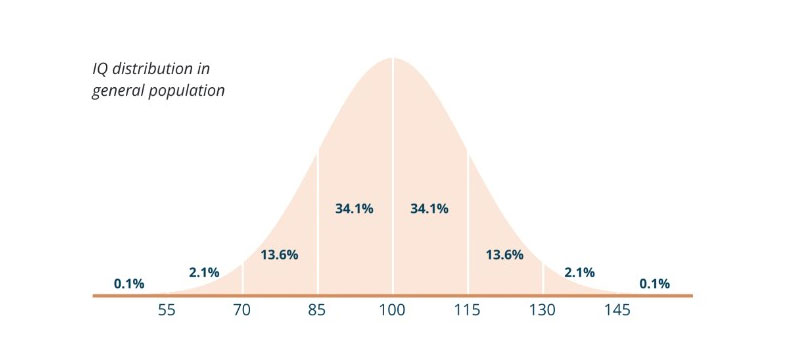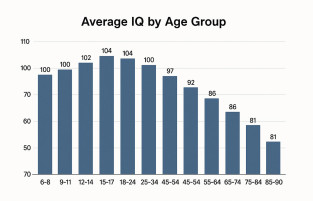The IQ scale is the spectrum range IQ score of intelligence on which a person falls after taking an IQ test. It is a standardized measure of cognitive abilities. Each spectrum of IQ scale interprets the specific meaning. The scale ranges from 40 to 160, with a score of 100 indicating average intelligence.
The IQ scale is a standardized measure of cognitive abilities. It was developed by Alfred Binet in the early 20th century and has since evolved into a benchmark for assessing intellectual prowess. At its core, the IQ scale conforms to a standard normal distribution curve, with a mean IQ score set at 100 and a standard deviation of 15 points.
The IQ scores for the entire world population range between 40 and 160. However, the majority of individuals score between 85 and 115. Those scoring 145 and above, which represents the upper 2% of the population, are deemed to be geniuses.
The IQ scale is often illustrated in the form of a graphic, as below:

Below 70: Intellectual Disability
Individuals scoring below 70 are often classified as having intellectual disabilities or low IQ. This score range signifies significant limitations in adaptive functioning, including communication, self-care, and social skills.
Intellectual disability, also referred to as intellectual developmental disability or historically termed "mental retardation," is characterized by significant limitations in both intellectual functioning and adaptive behavior, which cover many everyday social and practical skills. These limitations will cause an individual to learn and develop more slowly than a typical one.
Support and specialized interventions are crucial for individuals in this range to lead fulfilling lives.
70-85: Below Average
Generally, an IQ between 70 and 85 might be considered "below average" in terms of intellectual functioning. The term "below average" in the context of intellectual abilities often refers to an individual who has an IQ score or abilities that are below the median score or capabilities of the population.
For practical implications, a person with a "below average" score might find certain academic tasks more difficult and challenging compared to peers. Additionally, they may take more time to grasp new concepts or learn new skills and wouldn't experience difficulties in problem-solving or critical thinking tasks that are considered typical for their age group.
However, it is important to note that many individuals falling into this category can still lead entirely normal and independent lives. "Below average" doesn't necessarily indicate a disability or disorder; it is a statistical term and doesn't evaluate an individual's capabilities in a comprehensive manner.
Early intervention and tailored educational approaches can be beneficial in this case.
85-115: Average
Scoring between 85 and 115 places an individual within the average IQ range. People in this IQ range tend to have general intellectual functioning similar to the majority of individuals.
People with a score range between 85 and 115 can acquire new skills, knowledge, and concepts at a standard rate. They often manage to cope with the standard educational curriculum without requiring additional support. Otherwise, they are generally able to perform academically at a level that is expected for their age group.
Individuals in this range tend to develop adaptive skills that help them manage daily tasks and demands reasonably well. They usually don’t face significant challenges in areas such as socialization, communication, and self-care.
This range encompasses the majority of the population and represents a balanced cognitive profile.
115-130: Above Average
An IQ score between 115 and 130 suggests above-average cognitive abilities.
Individuals in this range often demonstrate a heightened ability to absorb complex information quickly. They may exhibit advanced problem-solving abilities and a capacity to understand intricate concepts more readily compared to the average population.
People with an above-average IQ might excel in an academic setting, often understanding new material more quickly than their peers. They might need less time to study and may benefit from advanced courses or enrichment programs that challenge them at their level of understanding.
These individuals often excel in academic settings and may have a competitive advantage in certain careers. However, success is not solely determined by IQ; other factors play a significant role.
130 and Above: Gifted
An IQ score of 130 or higher is often associated with giftedness. If your IQ score belongs to this group, then congratulations; you really have a gift.
Individuals with a high IQ range often learn new information remarkably quickly and with less repetition compared to those with average IQ scores. They might have a significant capacity to understand and solve complex problems, seeing connections and patterns that others may not notice. They may also be inclined towards fields where they can innovate and create new solutions, contributing significantly to advancements in their field.
Gifted individuals often have a deep curiosity and a strong desire to explore complex topics in depth. They may prefer the company of intellectual peers and seek out communities and groups that cater to individuals with high IQs. An IQ of 140 and above is considered a genius IQ, which is quite rare in the world. Only a few individuals own this genius IQ level.
When it comes to the factors constructing the IQ scale range, there are four major elements that have influenced a group’s IQ scale range.
1. Biological Factors
Geneticity plays a critical role in determining a person's baseline intellectual capabilities.
The overall structure and functioning of an individual’s brain, including aspects like the health of neurons and the connectivity between different brain regions, can influence IQ. Studies involving identical twins, who share 100% of their genes, often show high correlations in IQ scores, even when raised in different environments.
This suggests a strong genetic component to IQ. Family studies show that IQ is somewhat heritable, with genetic factors explaining a substantial portion (but not all) of the variance in IQ scores between individuals.
2. Educational Environment
The educational environment significantly affects a person’s IQ through various channels, shaping cognitive abilities and fostering intellectual growth. Let’s take a detailed look at how educational environments can impact IQ.
A nurturing educational setting promotes the development of critical thinking from an early stage, nurturing attributes that are later assessed in IQ tests. Having access to premium assets, such as experienced educators, state-of-the-art facilities, and rich educational content, can elevate the learning journey, potentially augmenting IQ scores.
Besides, an education system that advocates for in-depth comprehension over mere memorization is likely to cultivate advanced thinking abilities, which are essential elements in IQ assessments. Furthermore, involving students in extracurricular endeavors that stimulate rational thinking, including participation in chess or robotics groups, can potentially amplify cognitive skills.
3. Career and Job
The nature of one's career and daily work responsibilities can influence cognitive abilities over time, impacting IQ scores both directly and indirectly.
Jobs that entail complex problem-solving and critical thinking can foster cognitive growth, potentially enhancing IQ. Engaging in tasks that challenge the brain can potentially enhance cognitive abilities, impacting IQ positively. Besides, careers that encourage continuous learning and adaptation to new technologies and methodologies can help maintain or even increase cognitive abilities.
Moreover, learning and mastering specialized skills can foster cognitive development; different jobs nurture different skill sets, which might be reflected in different aspects of IQ tests. Lastly, regular training and professional development programs can aid in nurturing and enhancing different cognitive abilities, thereby positively influencing IQ scores.
4. Psychological and Social Considerations
Psychological and social factors play a substantial role in determining an individual's IQ. Firstly, mental health issues, including depression and anxiety, can impede cognitive function and potentially lower IQ scores. Developing cognitive resilience through strategies like mindfulness can potentially foster better mental health, which is conducive to maintaining or enhancing IQ.
Additionally, growing up in a stimulating environment that encourages curiosity and learning can foster cognitive development, potentially enhancing IQ.
Moreover, socioeconomic status (SES) can influence IQ through its impact on access to educational resources, nutrition, and healthcare. Greater educational opportunities, often available in higher socioeconomic environments, can foster cognitive development and, hence, potentially higher IQ scores. Furthermore, engaging in regular physical activity can foster better cognitive health, potentially positively influencing IQ.
In conclusion, understanding IQ and its measurement involves navigating the nuances of the IQ scale and the factors influencing it. Developed over a century ago and constantly refined, the IQ scale serves as a standardized means of assessing cognitive abilities across different age groups.
However, the IQ scale provides valuable insights but requires careful interpretation alongside additional assessments. Because Intelligence is a multifaceted and complex trait that extends beyond a single number on a scale.





